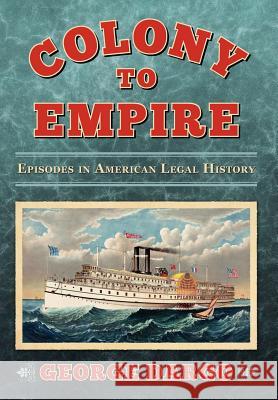From Colony to Colonial Power: Episodes in American Legal History » książka
From Colony to Colonial Power: Episodes in American Legal History
ISBN-13: 9781616191443 / Angielski / Twarda / 2012 / 386 str.
Description (3900 characters maximum): Clark, NJ: The Lawbook Exchange, Ltd., 2012. xxii, 363 pp. The noted historian and author of Jefferson's Louisiana has collected a dozen essays that span legal issues from the development of the United States from the legal rights of colonists, to the Red Scare of 1920, issues revolving around Sunday blue laws in Massachusetts in the 1950s to the legal issues regarding the status of Puerto Rico. Author Bio (3900 characters maximum): George Dargo 1935-2012] grew up in Brooklyn, New York. A graduate of Erasmus Hall High School and Columbia College, he completed his Doctorate in the Department of History at Columbia University and, later, earned his law degree at Northeastern University. His previous books include Jefferson's Louisiana, Roots of the Republic, Law in the New Republic, and A History of the U.S. Court of Appeals for the First Circuit. He was a Professor of Law at New England LawBoston from 1983 until his death. Volume: 1 Review 1 (3900 characters maximum): This book will stand as a monument to an extraordinary historian. George Dargo was one of those rare legal historians with both a PhD in History and a JD in Law. The newly revised and edited essays in Colony to Empire reflect the depth of his background in law and history and they represent the work of an impressive life in scholarship. Few legal historians could successfully write a book of such erudition covering the colonial period to the present. Dargo's achievement is breathtaking. Source: Kenneth S. Greenberg, Dean, Suffolk University, College of Arts and Sciences Review 2 (3900 characters maximum): Multiculturalism is a misapplied buzz-word today. For a true understanding of its role and application, many of the chapters in this book provide a useful corrective. Not only the chapters on Louisiana, but the episodes devoted to the work of Judge Calvert Magruder are particularly illuminating. This book highlights the unique qualities and special contribution that Judge Magruder personified. His broad vision and keen sensitivity enabled him to see decades in advance the true meaning of multiculturalism and how a great judge could advance that meaning in a constitutional democracy. This book brings to life many of these themes and qualities. Its broad reach and wide scope provide a critical new perspective on the role of law in American history. Source: Neil Hecht, Director, Institute of Jewish Law, Professor of Law Emeritus, Boston University School of Law











